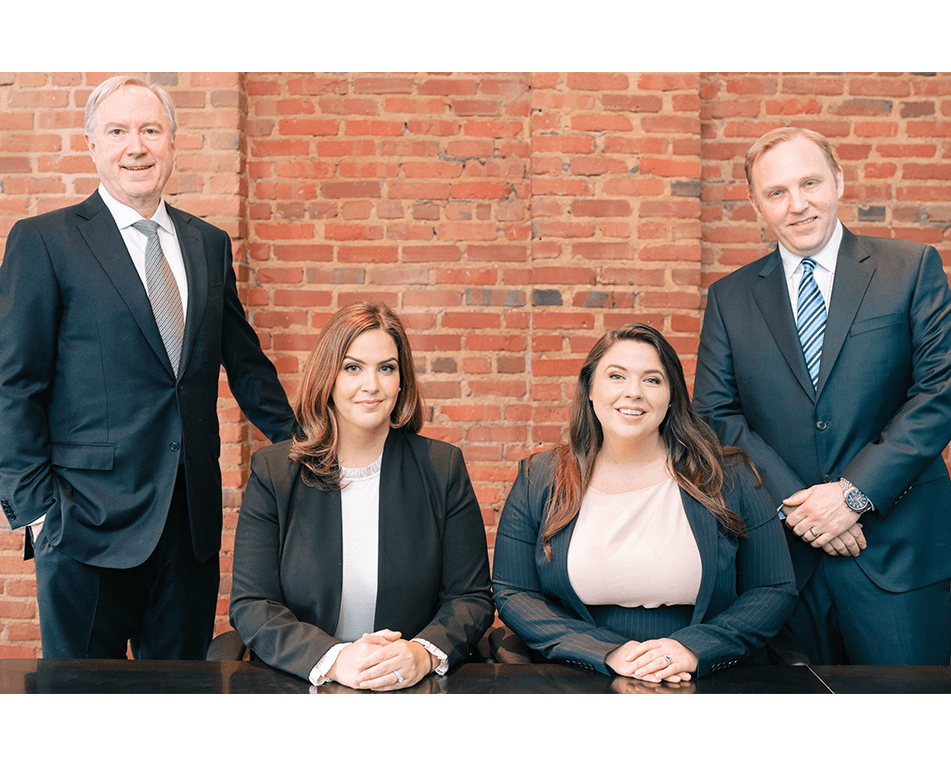
Atlanta Discrimination & EEOC Attorney
Discrimination in the workplace is an unfortunate, but long-standing problem in our society. There are numerous laws that protect employees from workplace discrimination, but seeking a legal remedy can seem a daunting experience. If you believe that you have encountered discrimination on the job and want to take appropriate action, it is critical to understand your rights—and to enlist the support of experienced Atlanta employment lawyers like the attorneys at Beal, Sutherland, Berlin & Brown. We understand how challenging the process can feel to people who have been victimized by unfair treatment in the workplace, and we have the knowledge, experience, and skill necessary to pursue the relief the law provides. We are also courtroom-tested and have a strong track record of success in high-stakes employment matters of every type.
Speak with a skilled EEOC and discrimination lawyer near you in Atlanta. Contact Beal Sutherland Berlin & Brown online or call (404) 476-5305 for a consultation.
Understanding Employment Discrimination Laws in Atlanta
Workplace discrimination occurs when an employer takes adverse action against an employee not for legitimate reasons, but because of the employee's race, national origin, gender, age, or other protected status. There are numerous state and federal laws that protect employees against workplace discrimination, and the attorneys at Beal, Sutherland, Berlin & Brown have substantial experience in handling these claims for every kind of worker. If you need an EEOC lawyer in Atlanta, our firm is ready to assist you.
Title VII makes it illegal for employers to discriminate against employees with respect to their compensation or other terms and conditions of employment because of the employee's race, color, religion, sex, or national origin. Adverse actions that may be challenged under Title VII include segregation in the workplace, refusal to hire or promote, discriminatory discipline, and wrongful termination. Title VII also prohibits employers from creating or failing to take action to correct a hostile work environment.
Additionally, understanding the nuances of each legislation is critical for effectively addressing discrimination. The impact of workplace discrimination extends beyond financial harm, affecting mental health and career progression. Workers suffering discrimination may face increased stress, anxiety, and depression. Addressing these issues comprehensively requires not only understanding legal rights but also having access to supportive systems that promote mental well-being and resilience. This holistic approach is essential for individuals navigating such challenging circumstances.

Important Federal Employment Discrimination Laws
- The Age Discrimination in Employment Act of 1967 (ADEA), which bans discrimination against employees who are over forty years old;
- The Americans with Disabilities Act of 1990 (ADA), along with amendments included in the Americans with Disabilities Act Amendments Act of 2008, and the Rehabilitation Act of 1973, ensure equal treatment and reasonable accommodations for those with disabilities, a history of a disability, or who are regarded as having a disability;
- The Equal Pay Act of 1963, requires that men and women who perform substantially similar work be compensated the same;
- The Family and Medical Leave Act of 1993 (FMLA), guarantees up to 12 workweeks of leave for employees who experience a serious health condition, who need to care for a family member with a serious health condition, or who celebrate the birth or adoption of a child;
- The Uniformed Services Employment and Reemployment Rights Act (USERRA), protects military service members and veterans from discrimination based on their service to our country and guarantees them the ability to return to their jobs upon deployment;
- The Civil Rights Acts of 1866, which included what is now referred to as Section 1981 and allows for claims of discrimination based on race and citizenship in the making and enforcement of contracts;
- The Civil Rights Act of 1871, which created what is now known as Section 1983, is a powerful law that allows claims against government employers for violation of any constitutional rights, including the rights to free speech, freedom of religion, unlawful search and seizure, due process, and equal protection of the law.
The attorneys at Beal, Sutherland, Berlin & Brown have handled numerous matters under each of these laws and many others. Our attorneys have even improved these laws by winning decisions in the Courts of Appeals and the U.S. Supreme Court which secured broader protection for employees. If you need a discrimination lawyer in Atlanta who understands these complexities, our team is here to help.
EEOC & Agency Investigations in Atlanta
There are several government agencies with jurisdiction to enforce many of the employment discrimination statutes. For example, the U.S. Equal Employment Opportunity Commission (EEOC) investigates and enforces Title VII, the Pregnancy Discrimination Act, the Equal Pay Act of 1963, the ADEA, the ADA, the Rehabilitation Act of 1973, and the Genetic Information Nondiscrimination Act of 2008. Similarly, the U.S. Department of Labor investigates and enforces the FMLA, USERRA, and the Fair Labor Standards Act, among others. These agencies also publish regulations and other guidance that help courts and attorneys interpret and apply these laws.
Understanding the agency processes is vital for navigating the complexities of employment discrimination claims. The EEOC, for instance, offers various resources to help complainants understand their rights and the steps they need to follow when filing a charge. It is also crucial to be aware of the time limits and procedural requirements that can affect a claim's viability. Agencies often provide mediation services, which can be an effective way to resolve disputes without lengthy litigation. Leveraging these investigative processes strategically can strengthen a claim and provide additional opportunities for relief and resolution for those working with an EEOC attorney in Atlanta.
Some federal employment discrimination claims must first be filed with an agency before they can be presented in court, and there are specific requirements for doing so. For example, claims under Title VII, the ADEA, and the ADA require that a person first file a charge of discrimination against their employer with the EEOC. A charge must usually be brought within 180 days of the discriminatory act, but if the employer is a state or local government, the deadline may be extended up to 300 days in certain cases. After receiving a charge of discrimination, the EEOC investigates the charge, which may include requesting documents and other evidence and interviewing witnesses. The EEOC administrative process may also include mediation, as well as a settlement negotiation process referred to as conciliation if the EEOC finds reasonable cause to conclude that there is a violation. Once this process concludes, the agency issues the "Notice of Right to Sue," which will enable the employee who filed the charge to proceed to court and file a lawsuit.
Properly handling an employment discrimination claim requires knowledge of the procedures of the federal agencies that investigate many claims, and experience in how to use these investigative processes to build a case. Beal, Sutherland, Berlin & Brown have this knowledge and experience and have worked with the EEOC to secure relief for countless clients. This makes us a preferred choice for those seeking an EEOC lawyer near me in the Atlanta area.
Proving Employment Discrimination with a Discrimination Lawyer Atlanta
Employment discrimination cases can often be very challenging. Aside from technical legal requirements, they must usually be proved with circumstantial evidence, which requires creativity and tenacity in litigation to uncover the documents and testimony that can be marshaled to convince a judge and jury that unlawful discrimination occurred. Laws and court rulings provide a general framework, but discrimination must be proved in concrete circumstances that are not always clear-cut. For example, was a person denied a promotion because of their skin color or because another applicant was more qualified? Was a person given a certain workload that might be considered less desirable for discriminatory reasons or valid, business reasons? Those are the questions that will be probed in a discrimination claim, and plaintiffs have to be ready to prove their claim, usually by disproving the reason an employer claims was the "real reason" for taking adverse action against an employee.
What Are Common Barriers to Proving Discrimination?
One of the most common barriers to proving discrimination is the reliance on circumstantial evidence. Direct evidence, such as a written statement or discriminatory policy, is rare. Therefore, claimants often have to piece together indirect evidence to show a pattern of discriminatory behavior or practices. This process requires meticulous documentation of workplace incidents, communication, and employment decisions over time. Gathering supportive evidence from co-workers or obtaining internal documents can also be challenging, as employees may fear retaliation or lack access to critical information.
Another significant barrier is proving intent. Discrimination often occurs subtly and may be masked by seemingly neutral policies or practices. Employers might justify adverse actions as decisions based on performance or business needs. Overcoming this justification involves critically analyzing employment records, and witness testimonies, and comparing the treatment of similarly situated employees. This complex task underscores the importance of having a skilled legal representation who understands how to identify and challenge discriminatory intent under the law.

The lawyers at Beal, Sutherland, Berlin & Brown drill down into the details and aggressively investigate each situation, beginning with document review, interviews of witnesses, and developing evidence through agency investigations. Every seemingly small piece of evidence adds up—from the statement of a witness who heard discriminatory remarks, to a history of discrimination complaints and lack of investigations by the company, to the records that show an employer's reason for taking action doesn't make sense. Beal, Sutherland, Berlin & Brown does the hard work our clients rely on to piece together their cases.
Preparation is key when taking a discrimination matter to court. Apart from gathering robust evidence, understanding the opponent's defense strategy is crucial. Comprehensive pre-trial preparations, including mock trials and strategic planning sessions, are vital to anticipate challenges and refine arguments. This dedication to thorough preparation helps ensure our clients have the strongest possible representation throughout the litigation process.
Once a case is ready for court, the attorneys at Beal, Sutherland, Berlin & Brown are prepared to litigate as long as it takes to secure relief. Some of the employment discrimination laws have limitations on the damages, but our attorneys know how to maximize a jury award. For example, under the ADEA and the FMLA, only lost wages and benefits of employment, plus an equal additional amount as liquidated damages, and front pay are available. For claims brought under Title VII or the ADA, an employee may be awarded lost wages and front pay, as well as from $50,000 to $300,000 per violation for emotional distress and punitive damages. All of the primary federal employment discrimination laws provide for employees to recover reasonable attorney's fees and costs of litigation. These attorney's fee provisions enable attorneys to take discrimination matters that may not involve large amounts of lost wages or other damages.
Serious Issues Call For a Dedicated Atlanta Discrimination Attorney
Discrimination is a serious matter, and getting the relief the law provides is just as serious. People have the right to make a living and the right to be treated fairly by their employers. Discriminatory treatment violates personal dignity, hinders professional advancement, and injures all of society. Fighting it takes a lawyer who understands how to investigate, and then knows how to litigate. At Beal, Sutherland, Berlin & Brown, we aren't afraid to make our case in front of a jury. That can prove valuable, not just in court, but as leverage in negotiations.
Our ability to navigate the legal landscape with confidence is a result of years of experience and consistent dedication to our clients' rights. We stay up-to-date with evolving laws and legal precedents, ensuring that our strategies are both innovative and grounded in the latest legal understandings. This dynamic approach helps us provide effective advocacy, reinforcing our commitment to justice and fairness.
Overcoming Workplace Discrimination Barriers in Atlanta
Atlanta is home to a diverse workforce, yet workplace discrimination remains a pressing issue. Understanding the cultural and social dynamics specific to the city can help in addressing discrimination more effectively. Employees may face unique challenges due to the specific industries prevalent in Atlanta, such as media, finance, and technology, and it's essential to consider these sector-specific nuances when evaluating potential discrimination.
In Atlanta, building a discrimination claim often involves engaging community organizations and advocacy groups focused on workplace equality. These groups can provide support and resources, helping to bolster claims through shared experiences and collective action. Additionally, staying informed about local legal precedents and regulatory changes in Georgia can be crucial for both employees and employers striving to foster a fair workplace environment.
Our attorneys have decades of experience representing employees in workplace discrimination cases in Atlanta and throughout Georgia. We have successfully represented thousands of clients in negotiations with their employers, before the EEOC, and in state and federal courts, including jury trials and appeals, even to the U.S. Supreme Court. We believe that everyone who works for a living deserves equal treatment and dignity in the workplace, and have proven our ability to use the law to protect your rights and create greater fairness and equity in countless workplaces.
If you are a victim of discrimination at work, do not hesitate to reach out to Beal Sutherland Berlin & Brown. Call (404) 476-5305 or submit an online form to schedule an appointment.
Frequently Asked Questions About EEOC & Discrimination in Atlanta
What Are the First Steps to Take If I Experience Workplace Discrimination in Atlanta?
If you experience discrimination at work in Atlanta, the first step is to document everything related to the incident. Record dates, times, locations, involved parties, and any specific discriminatory remarks or actions. Preserve emails, messages, or any other relevant communication that may substantiate your claims. Secondly, report the incident to your employer’s HR department as they may have protocols for handling such issues. If the issue is not resolved internally, consulting with an employment attorney can help you understand your rights and plan an appropriate course of action. Remember that there are time limits for filing discrimination charges with the EEOC, typically within 180 days of the incident, so consider seeking legal advice promptly.
Are There State-Specific Anti-Discrimination Laws in Georgia That Differ from Federal Laws?
Yes, Georgia has specific anti-discrimination laws that complement federal regulations. While the federal laws enforced by the EEOC apply nationwide, Georgia state laws sometimes offer additional protections or address narrower claims not covered under federal law. For instance, Georgia does not have a comprehensive state law equivalent to Title VII or the ADA, but state agencies like the Georgia Commission on Equal Opportunity play a role in investigating discrimination in government employment. Understanding both sets of laws can be crucial for Atlanta residents pursuing discrimination claims, particularly when facing unique local issues not directly addressed by federal mandates. Working with an experienced Atlanta-based attorney ensures a comprehensive approach that considers both state and federal protections.
How Effective Is Mediation for Resolving Discrimination Disputes?
Mediation can be a highly effective method for resolving discrimination disputes, especially in an employment context. It provides a confidential setting for both parties to discuss their issues openly and work towards a mutually agreeable outcome, potentially saving time and resources compared to litigation. The process is facilitated by a neutral third-party mediator who helps guide the dialogue, ensuring that both the complainant's and employer's perspectives are adequately explored and considered. In Atlanta, mediation is often encouraged to address workplace disputes amicably before they escalate into more formal legal action. The flexibility of mediation allows for creative solutions that might not be available in a courtroom setting, often leading to quicker resolutions and preserving professional relationships where possible.
What Makes Beal, Sutherland, Berlin & Brown a Top Choice for Discrimination Matters in Atlanta?
Beal, Sutherland, Berlin & Brown stands out as a top choice for handling discrimination matters in Atlanta due to its unwavering commitment to protecting the rights of employees. With a proven record of tackling complex legal challenges and achieving favorable outcomes, our attorneys offer comprehensive litigation services tailored to address each client's unique circumstances. Our dedication to justice is matched by our understanding of the local legal landscape, ensuring strategies are both effective and contextually relevant. We prioritize understanding the nuances of each situation and leverage our extensive experience to provide insightful advice and advocacy. Clients trust us not only for our legal acumen but also for our compassionate approach and relentless determination to seek fair treatment for all.
Contact us if you believe you have been a victim of workplace discrimination or if you believe your right to equal treatment under the law is being threatened.
At our law firm, our trusted attorneys practice with excellence, ensuring clients receive the best legal representation. With dedication and skill, we navigate complex legal challenges, delivering successful outcomes and upholding the highest standards of professional integrity.



5 Star reviews
-
“Rachel Berlin Benjamin brought peace and wholeness to me and my family!”- Tracy N.
-
“Rachel Berlin Benjamin Esq expertly and efficiently handled my case.”- Patti
-
“I had an exceptional experience with Rachel Berlin Benjamin.”- Morgan D.
-
“Tremendous experience with Rachel and her team.”- Brian J.
-
“a professional service and excellent compliance and efficiency”- Carlos M.
-
“This Firm did in fact win one for the average Joe & I highly recommend them.”- Shawn F.
-
“Definitely exceeded expectations.”- Marcus C.
-
“- Susan C.
”Rachel was amazing and made the process better than expected.














.2301230958131.jpg)
.2301230958491.jpg)
.2301230954223.jpg)


.2301231005031.jpg)




